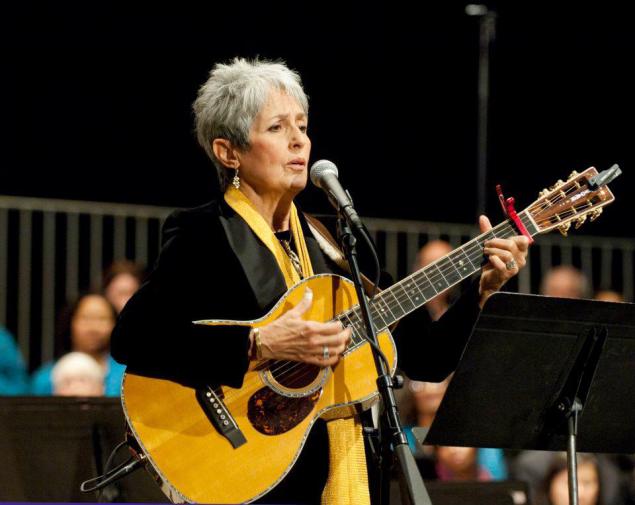Music |
Joan Baez
By
Published: Jan 28, 2016
Category:
Country
“I never dared to be radical when young,” Robert Frost said, “for fear it would make me conservative when old.”
Joan Baez is Exhibit A that Frost was wrong.
Celebrating her 75th birthday with the taping of a PBS show at the Beacon Theater, Joan Baez looked like an advertisement for Pilates, meditation and the examined life. She wore black jeans, a black satin blouse and a tuxedo jacket, and my first thought was: Joanie Cash. But all that black was more than a folkie uniform. The black contrasted with her cropped white hair and the unlined glory of her face, and my second thought was: Her beauty has as much to do with her life choices as with genetics.
The first words she sang were from a song by Steve Earle — “I believe in prophecy/ Some folks see things not everybody can see/ And once in a while/ they pass the secret along to you and me.” The accuracy brought shivers. From 1960, when she released her first album, her life has been an unbroken stream of gestures that should have condemned her to the margins of music but have instead made her a role model. [To buy the CD of her “Greatest Hits” and get an MP3 download from Amazon, click here. For the MP3 download, click here. Baez is on tour through March. Ann Arbor, Toronto, Ithaca, Concord (New Hampshire), New Haven, Burlington, Englewood, Red Bank, Frederick (Maryland) Lexington, Charleston, Atlanta, Birmingham, Durham, Wilmington, Albany and Buffalo. For information and tickets, click here.]
A role model who’s never wavered, even as, she says, “We head into the abyss.” Her credo:
People say to me how do you maintain your optimism? Guess what? I never had much. The miracle is to go off and do something anyway. To whatever extent you can lead a decent life and also do something for other people is the thing. I never remember where this comes from, but someone said there is only the trying and the rest is not our business.
The New York concert, which will be broadcast in the “Great Performances” series in June on PBS, was built around duets with musicians who endorse that philosophy: David Bromberg, Jackson Browne, Mary Chapin Carpenter, Judy Collins, David Crosby, Emmylou Harris, Indigo Girls, Damien Rice, Paul Simon, Mavis Staples, Richard Thompson, and Nano Stern. Not that she needed others to bolster her aging voice. She still owns the lower register and when she reaches for the soprano, the familiar tremble dazzles. The set list was her greater hits — the early Dylan songs that introduced him and made her, “The Night They Drove Old Dixie Down,” “Diamonds and Rust”) , but it was the surprises that stood out. David Crosby, looking like a Chinese tea master from a distant century, sang “Blackbird” with her. Duets with Jackson Browne (“Before the Deluge”) and Paul Simon (“The Boxer”) were no-brainers. And, no surprise, Mavis Staples challenged her to reach for the heavens (“Freedom”). For her encore, she sang “Forever Young.” Of course.
Every year, I get invited to Glamour Magazine’s “Women of the Year” Awards. I bring my daughter because anything that didn’t happen in the last two weeks is news to her. (“Barbra Streisand? Is she still alive?”) So for those who know of Joan Baez because their parents — or grandparents — used to listen to her, here’s a short guided tour.
Her story starts with the ultimate impeccable credential: a romance with young Bob Dylan
She was arrested during a protest against the Vietnam War.
She sang at Woodstock.
In this century, she sang “We Shall Overcome” at the White House.
Give her the last word: “Action is the antidote to despair.”
BONUS VIDEO


